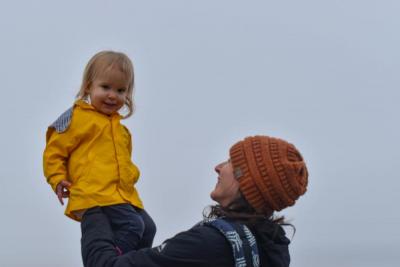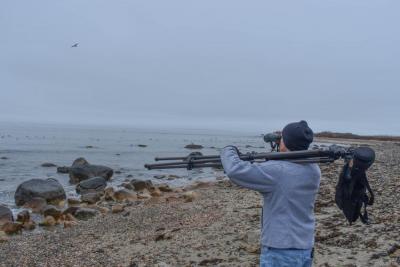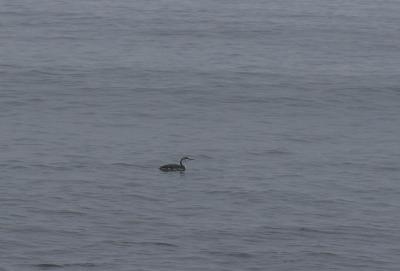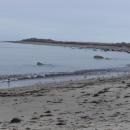Lloyd Center kicks off new year with search for birds
WESTPORT — The Lloyd Center for the Environment is hoping to make 2022 the year for the birds.
Specifically, a year where birds such as waterfowl can thrive.
To kick off 2022, the Dartmouth-based nonprofit hosted a walk on Jan. 2 at Westport’s Gooseberry Island where research associate Jamie Bogart explained coastal ecology and bird identification.
Along the walk, around a dozen avian enthusiasts spotted around 10 different species of birds including common goldeneyes, sandpipers, and red-throated loons.
“It’s been a good day for bird spotting,” Bogart said. “Mild temperatures, low wind — certainly better weather than yesterday.”
Dartmouth resident Nancy Rice was especially happy to see the loons in the water. She said they reminded her of a trip she took in Vermont this past summer.
“There were some lovely loons out there and seeing them here brought it all back,” Rice said. “Loons are amazing.”
Fellow Dartmouth resident Holly Perry said what she appreciated about the walk was that it allowed her young family to appreciate nature and connect with people.
“It’s just good to get around,” she said.
The Gooseberry walk, Bogart said, is the first of many he and the Lloyd Center plan to conduct throughout 2022 including owl prowls and tracking birds during their spring migration.
Along with advocacy through walks, Bogart said the bulk of the work will come through the continuation of protecting waterfowl habitats.
“The habitats here are pretty stable,” he said. “As long as we keep setting land aside these animals are going to do well.”
Along with working to establish conservation restrictions, Bogart said the nonprofit has ongoing contracts with West Island in Fairhaven and Bakers Beach in Westport to conserve populations of piping plovers, a threatened species of shorebird that lives along the Atlantic coast and around the Great Lakes.
Each nesting season, Bogart puts up fencing and signs to prevent people, pets, and off-road vehicles from disturbing or trampling their habitats.
“We’ve protected the piping plovers for decades,” he said.
Bogart added that there will also be additional research projects involving the plover population.
Along with working to protect birds, he said the Lloyd Center also plans to continue with its yearly moth inventories and continued advocacy for environmental protections.
“We’re certainly busy,” Bogart said with a laugh.


















